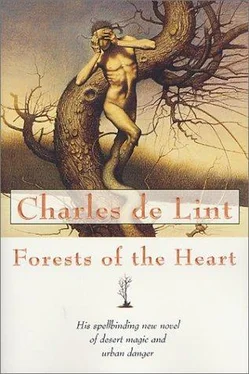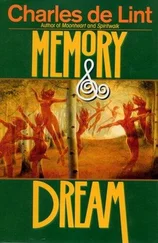The vegetation was different, too—some of the saguaro were taller than she remembered, others smaller. The prickly pear grew in changed patterns. There were no jojoba bushes close to the cliff itself.
“Por favor,” she said, meaning to address the spirits of this place, to beg their indulgence and ask for guidance, but then she heard something odd.
She sat up straighter, head cocked to listen. The sound she heard was singing, a singing that seemed to be a mix of high-pitched children’s voices and coyote yips. It came from just over the next rise where a flush of prickly pear clustered at the base of another tall saguaro, the same piece of nonsensical verse repeated over and over with an innocent exuberance that pulled a smile from her tight lips:
No somos los lobos no somos los perros somos los cadejos cadejos verdaderos.
Fearful still, but too curious now to be cautious, she clambered up the slope to peek over the other side of the ridge. Her smile broadened into a delighted grin and all fear fell away when she saw the improbable singers. They were dogs, a small pack of gamboling, dancing, warbling beasts, not one of them taller than her knee in height; six, perhaps seven—it was hard to count, they moved so quickly. That they could sing was surprising enough, but their colors were what took her breath away. Their short fur was the startling hue of Mexican folk art: a mottled rainbow of bright blues and yellows, lime greens, deep pinks, purples, and oranges. A child’s palette that filled her gaze with the same potency that a particularly hot chile salsa brought to the roof of the mouth—almost painful in its intensity, yet ever so pleasurable all the same.
What would such fur feel like? she couldn’t help but wonder. Soft, or stiff like a terrier’s?
Because there was something of a bull terrier in the shape of their heads, long and rounded like a bullet. But they weren’t quite as barrel-chested. Looking more closely, she saw that instead of a dog’s paws, they had the feet of goats. The sound of their little hooves on the rocks as they danced added a counterpoint rhythm to their song.
Clickity-clackity-click.
We are not wolves, we are not dogs.
Clickity-click.
We are cadejos.
Clackity-dick.
Cadejos, truly.
Clickity-clackity…
She started to stand, wanting to go down, to join them and make a joyful noise. To be a cadeja to their cadejos, whatever a cadejo might be. It didn’t really matter. She could be happy to paint her skin a dozen bright colors and dance in the sun with them.
“I wouldn’t go down there,” a voice said.
Startled, she slipped a few steps back down her side of the slope and turned to see a roadrunner lolling on a nearby rock. She looked around, but there was no one nearby who could have spoken unless it was an invisible spirit.
She shivered at the thought and returned her attention to the roadrunner. It was lying with its back to the sun, tail dropped, wings spread wide, the speckled feathers lifted on its back and crest to expose a “solar panel” of jet black underfeathers and skin. Bettina had seen them do this before, absorbing heat from the sun, but usually this was only in the winter when their body temperature dropped overnight. The birds used the sun’s energy to warm themselves up, rather than increasing their metabolic rate the way hummingbirds or poorwills might, reducing their caloric needs by as much as forty percent—the equivalent to her skipping breakfast or lunch. In the winter, when food was in short supply for the birds, it was an efficient way to heat their bodies.
She shook her head. Why was she thinking such things? She wasn’t in school, or learning lessons while out hiking with her abuela.
She looked again past the sunning roadrunner, out over the rough scrub of the bajada. Singing dogs were one thing—especially when they seemed so full of fun—but she wasn’t sure she was really prepared for invisible spirits.
“¿Quien hablo?” she asked, pitching her voice low so that it wouldn’t carry to the strange dogs cavorting on the other side of the ridge. Who spoke?
The roadrunner cleared its throat.
“Are you always this rude?” it asked when it saw it had her attention.
Bettina regarded the bird for a long moment. The dogs should have prepared her for this. This was la epoca del mito, after all. The place where, according to Abuela, what passed as folktales in their world were no more than matter-of-fact occurrences.
“Perdona,” she said finally. I’m sorry.
“I should think so. What would your grandmother say?”
“My grandmother?”
“¡Claro! Everyone in this place has heard of her: Dorotea Munoz— la curandera de pequenos misterios. ”
“How do you know her?”
“Let’s say we have shared certain… intimacies.”
Bettina’s eyes widened. “But you… you’re a bird.”
“Is that what you see?”
As Bettina began to nod, the roadrunner folded up its short, rounded wings and rose onto its feet. A heat wave traveled the length of its speckled black and white plummage, heightening the greenish iridescent cast the feathers already held. Bettina found her gaze caught by the bright blue around its eyes where the heat wave shimmered the strongest. The intensity of those blue feathers brought a return of the vertigo she’d suffered in I’itoi’s cave and she had to close her eyes for a moment. When she opened them again, the road-runner was gone.
A small, dark-skinned man sat in its place.
“¡Dios mio!” Bettina managed to squeeze from a suddenly dry mouth.
In any other circumstance, she would have given him no more than a passing glance. He was short in stature, certainly shorter than herself, but otherwise he could have been any middle-aged O’odham on the rez. Scuffed cowboy boots, worn blue jeans, white cotton shirt, baseball cap. But his eyes were almost black, with bird-bright highlights and circles of blue shadow, his face long and lean, especially his nose. There was a roadrunner speckling of black and white in his dark brown hair, and he carried enough weight around his waist to give him the body shape of a bird.
“Where did you come from?” Bettina asked, though she already knew.
The man smiled. “Where did any of us come from?”
“That’s not an answer.”
“Perhaps not. But I believe the most important questions only lead to more questions.”
“Now you sound like mi abuela. ” Bettina said.
“A fine woman. You must give her my regards.”
“Who shall I say is sending them?”
“Tadai.”
“You mean Tadai Namkam? ¿ Cómo un apodo?”
“No, not a nickname. Just Tadai, nothing more…”
Bettina shook her head. Tadai was simply the O’odham word for road-runner. It was as if Bettina were to call herself Chehia. Girl. Then she found herself wondering if her present experience was like Ban’s meeting with the coyote that had given him his tribal name. Perhaps now she’d be called Tadai Namkam. It was all very confusing. But one thing her fifteen-year-old wisdom told her:
“That’s not a regular name,” she told him.
“And yet it’s the only one I have,” Tadai said.
Bettina gave him a considering look. “¿Es verdad?”
“Mas o menos.” More or less.
Aha. But she decided not to press him on it. She was more interested in the singing dogs.
“Why did you warn me away from the dogs?” she asked, hoping to get a straightforward answer for a change.
“Not dogs,” Tadai said. “Cadejos. Weren’t you listening to their song?”
Читать дальше












